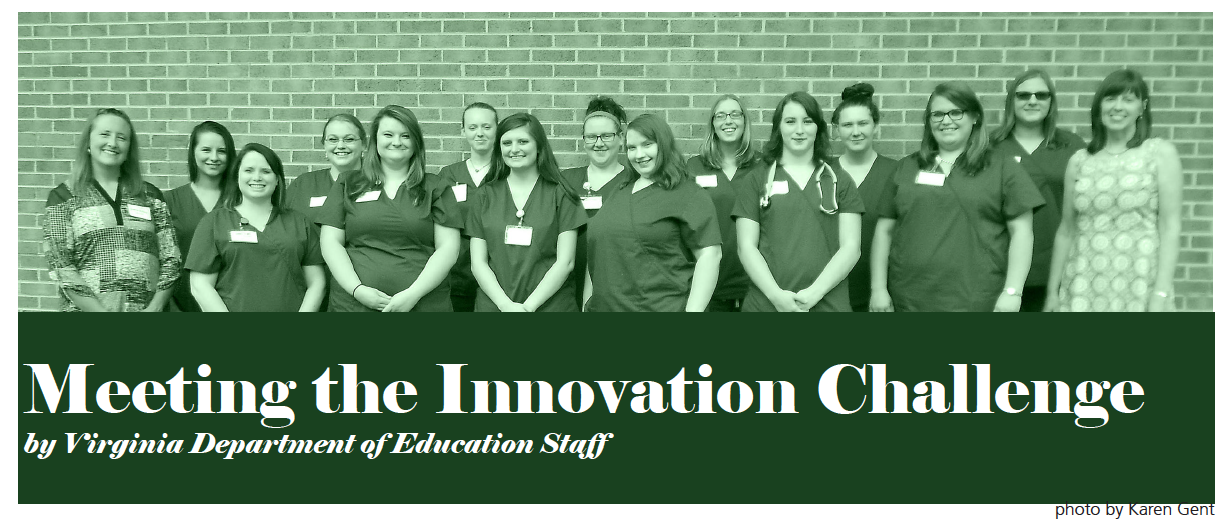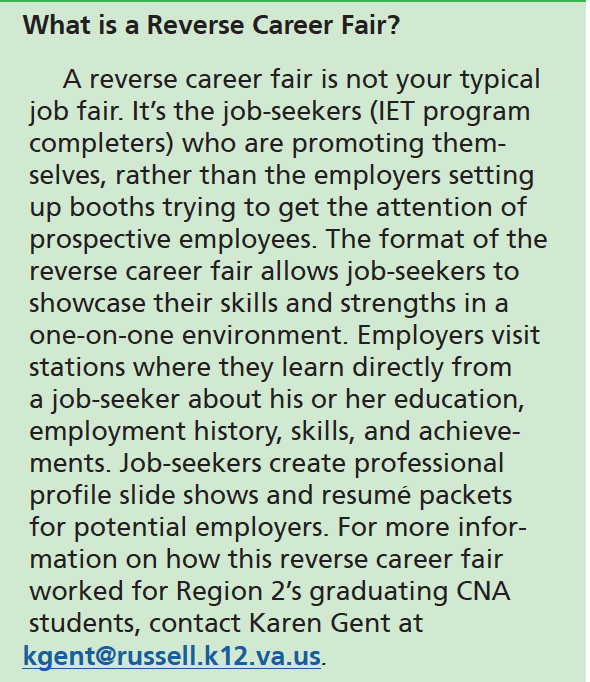Meeting the Innovation Challenge

The Innovation Challenge Grant was announced to program managers in November of 2017, the applications were due February 1, and activities funded by the grant had to be completed by June 30. This quick turn-around grant used reallocation reserve funds from the 2016-2017 program year and was established to address the priorities of increasing enrollment and retention, increasing measurable skill gains, and addressing WIOA priorities such as offering integrated education and training (IET) programs.
These programs demonstrated that they could, in a compressed time period, design interventions for outcomes, leverage community partnerships, and deliver results for their participants and communities.
Recipients of the grant shared their outcomes and lessons learned at the July Adult Education and Literacy Conference in Williamsburg. In case you missed the session, some highlights are below. These programs demonstrated that they could, in a compressed time period, design interventions for outcomes, leverage community partnerships, and deliver results for their participants and communities. Way to go, 2017-2018 winners!
Region 1, Regional Adult and Career Education, created a Laptop Learners program to offer on-demand, online learning to students without transportation, reliable Internet service, and/or personal computers. Using laptops refurbished by the Lee County Career and Technical Center, the program was able to loan the laptops to adult students who had the opportunity to earn the laptop outright if they completed the program. Twenty students enrolled, and 17 were retained through the end of the program, logging 516 contact hours. Twenty GED® subtests were passed, and four GED® credentials were earned during the program. The program reports that its greatest challenge was the true depth of the digital divide in the region, and staff had to face a combination of topography, economic development, and poverty. “We thought our learners simply could not afford Internet service… In reality, our students live on mountain roads and on ridges where Internet services have not been built out.” The solution was to loan students wireless hotspots, but even with these devices, students had to find locations with sufficient reception to log onto the distance curriculum.

Region 2, Southwest Regional Adult Education, created an IET program to train students as Certified Nursing Assistants. Eighteen students completed the training, earning a CPR Certification and completing REVIVE! Lay Rescuer training, and 16 have received their certification from the Virginia Board of Nursing. Thirteen graduates are employed (see the sidebar about the “reverse career fair” the program held), and one is enrolled in a Licensed Practical Nursing program. One of the biggest challenges was managing the overwhelming response to the opportunity. The program met its target of 40 candidates within the first week of promotion and has a 60-person waiting list for the fall 2018 cohort.
Region 4, New River Community College, used its Challenge fund to extend classes through the end of June. This allowed 89 students to continue their studies, logging 1,051 attendance hours. Eight of the students earned a GED® credential and others passed three or fewer subtests. Three students have subsequently enrolled in postsecondary education. The English language acquisition classes extended programming for two weeks to focus on workforce preparation activities, including resumé writing, cover letters, and interviewing. The students showed their appreciation for the focus of the extra classes with perfect attendance.
Region 6, the Shenandoah Initiative for Adult Education, engaged with a new partner at the regional jail to offer adult basic education and workforce preparation classes. The program had 25 students, logging 844 hours, from a population not previously served by adult education. Eight students earned Career Readiness Certificates, four applied for educational assistance through Virginia Career Works–Shenandoah Valley, and a pre-GED® pathway was established to complement the existing GED®-prep class the jail offers. Lessons learned on how to manage enrollment and student transfers among this population are being applied to further collaborative projects.
Region 14, Southside Virginia Community College Transitional Programs, received an award to expand their IET programming with the community college’s commercial truck driving training program. They were able to sponsor 19 students to earn their Class A Commercial Driver’s License and gain employment immediately upon completion.
Region 21, Peninsula Regional Education Program, was awarded two grants. For one of the grants, the program expanded English language acquisition and workforce prepa-ration services through a partnership with a local community-based refugee resettlement organization and was able to log nearly 2,000 additional hours of attendance. With the second grant, the program established an IET program with Thomas Nelson Community College and served 21 students for 2,149 hours. Fourteen students in the IET program earned the American Hotel and Lodging Kitchen Cook certification, and two are con-tinuing in an apprenticeship program.
Watch for the 2018-2019 Innovation Challenge announcement this fall. Start a conversation in your program about how a focused intervention could address local needs and opportunities.
This article was prepared by the staff of the Virginia Department of Education’s Office of Career, Technical, and Adult Education.